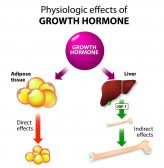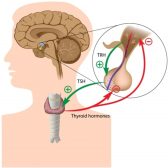Definition
noun, plural: growth hormones
A polypeptide hormone that in humans and other animals essentially promotes growth
Supplement
In physiology, a hormone refers to any substance produced and secreted by an endocrine gland. (Nevertheless, the term is sometimes used to include signaling molecules involved in autocrine and paracrine signaling.)
Growth hormone (GH) is one of the hormones produced by the body. It is a polypeptide that, in essence, promotes a wide range of activities in the body which stimulate growth. The hormone, in particular, promotes the lengthening of bones, which in turn helps to provide support for the future growth of the organism. Generally, GH promotes protein synthesis.
Growth hormones are primarily produced and secreted by the somatotropic cells of the anterior pituitary. In humans, it is called human growth hormone (hGH) or somatotropin, and is encoded by the GH1 gene located at the growth hormone locus on chromosome 17. The hGH is a polypeptide comprised of 191 amino acids. It stimulates target cells, e.g. liver cells, as it binds to the specific receptor on the surface of the cell. The binding of hGH on the cell surface receptor of the liver cell, for instance, will stimulate the latter to produce insulin-like growth factor 1 (IGF-1). IGF-1, in turn, stimulates systemic body growth, promoting growth on almost every cell in the body (e.g. skeletal muscle cells, chondrocytes, osteoblasts, skin cells, hematopoietic cells, etc.).
The growth hormone produced from the placenta is called placental growth hormone (PGH) or growth hormone variant. In humans, PGH is encoded by the GH2 gene on chromosome 17. The protein belongs to the somatotropin/prolactin family of hormones and becomes the predominant form of growth hormone in the body during pregnancy.
Abbreviation/Acronym:
- GH
Synonym(s):
See also:
- dwarfism
- anterior pituitary
- hormone
- somatotroph
Related term(s):






